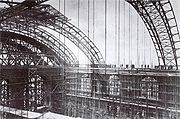
Heinrich Seidel
Encyclopedia

Perlin, Germany
Perlin is a municipality in the Nordwestmecklenburg district, in Mecklenburg-Vorpommern, Germany....
, Mecklenburg-Schwerin
Mecklenburg-Schwerin
Mecklenburg-Schwerin was a duchy in northern Germany created in 1348, when Albert II of Mecklenburg and his younger brother John were raised to Dukes of Mecklenburg by King Charles IV...
– 7 November 1906, Berlin
Berlin
Berlin is the capital city of Germany and is one of the 16 states of Germany. With a population of 3.45 million people, Berlin is Germany's largest city. It is the second most populous city proper and the seventh most populous urban area in the European Union...
) was a German
Germany
Germany , officially the Federal Republic of Germany , is a federal parliamentary republic in Europe. The country consists of 16 states while the capital and largest city is Berlin. Germany covers an area of 357,021 km2 and has a largely temperate seasonal climate...
engineer
Engineer
An engineer is a professional practitioner of engineering, concerned with applying scientific knowledge, mathematics and ingenuity to develop solutions for technical problems. Engineers design materials, structures, machines and systems while considering the limitations imposed by practicality,...
, poet
Poet
A poet is a person who writes poetry. A poet's work can be literal, meaning that his work is derived from a specific event, or metaphorical, meaning that his work can take on many meanings and forms. Poets have existed since antiquity, in nearly all languages, and have produced works that vary...
and writer
Writer
A writer is a person who produces literature, such as novels, short stories, plays, screenplays, poetry, or other literary art. Skilled writers are able to use language to portray ideas and images....
.
Life

Anhalter Bahnhof
The Anhalter Bahnhof is a former railway terminus in Berlin, Germany, approximately 600 metres southeast of Potsdamer Platz. Although the station was closed in 1952, the name lives on in the Berlin S-Bahn station of the same name.- Early days :...
railway station in Berlin, where he was the first to achieve the construction of its main hall roof
Roof
A roof is the covering on the uppermost part of a building. A roof protects the building and its contents from the effects of weather. Structures that require roofs range from a letter box to a cathedral or stadium, dwellings being the most numerous....
with a free span of 62,5 m. However, in 1880 he gave up the profession to dedicate himself to writing.
In Berlin, Heinrich Seidel became a member of the Hütte Academic Association "A.V. Hütte" and the literary society Tunnel über der Spree
Tunnel über der Spree
Der Tunnel über der Spree was a German literary society based in Berlin, founded on 3 December 1827 by Moritz Gottlieb Saphir. Most active between 1840 and 1860, it acquired 214 members and influenced literary life in Berlin for more than seventy years....
. Under the pseudonym Johannes Köhnke he collaborated with Julius Stinde
Julius Stinde
Julius Stinde , German author, was born at Kirchnüchel in Holstein, the son of a clergyman.Having attended the gymnasium at Eutin, he was apprenticed in 1858 to a chemist in Lübeck. He soon tired of the shop, and went to study chemistry at Kiel and Giessen where he proceeded to the degree of...
(pseudonym Theophil Ballheim), Johannes Trojan and others in the Allgemeiner Deutscher Reimverein (ADR), where he achieved impressive achievements as an rhyme
Rhyme
A rhyme is a repetition of similar sounds in two or more words and is most often used in poetry and songs. The word "rhyme" may also refer to a short poem, such as a rhyming couplet or other brief rhyming poem such as nursery rhymes.-Etymology:...
acrobat (literal translation of Reimakrobat).
The famous catchphrase "Dem Ingenieur ist nichts zu schwer" (to an engineer nothing is too difficult) was his personal motto
Motto
A motto is a phrase meant to formally summarize the general motivation or intention of a social group or organization. A motto may be in any language, but Latin is the most used. The local language is usual in the mottoes of governments...
and the first line of his writing Ingenieurlied (Song of an Engineer).

Works
- Aus der Heimat, Novellen, 1874
- Vorstadtgeschichten, 1880
- Leberecht Hühnchen, Jorinde und andere Geschichten, 1882
- Im Jahre 1984, 1884
- Neues von Leberecht Hühnchen und anderen Sonderlingen, 1888
- Natursänger, 1888
- Leberecht Hühnchen als Großvater, 1890
- Sonderbare Geschichten, 1891
- Von Perlin nach Berlin, Lebenserinnerungen, 1894 (new edition 2006)
- Leberecht Hühnchen (Gesamtausgabe), 1901
- Heimatgeschichten (Gesamtausgabe), 1902
- Reinhard Flemmings Abenteuer zu Wasser und zu Lande (3 Bde.), 1900-1906
- Ingenieurlied
External links
- Texte von Heinrich Seidel (Projekt Gutenberg-DE)
- Heinrich Seidel in der Chronik der HÜTTE
- Alfred Biese: Kurze Autobiographie
- Kurzbiografie zu Heinrich Seidel
- Über "Leberecht Hühnchen"

